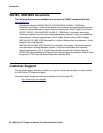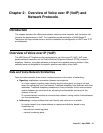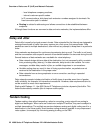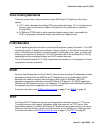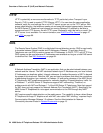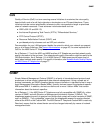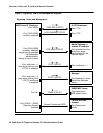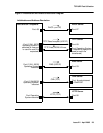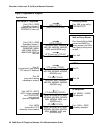
Overview of Voice over IP (VoIP)
Issue 2.2 April 2005 23
Voice Coding Standards
There are several voice coding standards. Avaya 4600 Series IP Telephones offer these
options:
● G.711, which describes the 64 kbps PCM voice coding technique. G.711-encoded voice is
already in the correct format for digital voice delivery in the public phone network or
through PBXs.
● G.729A and G.729B, both of which describe adaptive code-excited, linear-predictive
(CELP) compression that allows voice to be coded into 8 kbps streams.
H.323 Standard
Internal signaling provides connection control and call progress (status) information. The H.323
standard is used for IP packet voice networks’ internal signaling. H.323 defines more than just
voice. H.323 defines a complete multimedia network, for example, voice, video, and data, with
everything from devices to protocols. The H.245 standard links all the entities within H.323 by
negotiating facilities among participants and H.323 network elements.
The H.323 standard makes G.711 PCM compression the default form of compression. All other
compression formats are optional.
DHCP
Dynamic Host Configuration Protocol (DHCP) allows a server to assign IP Addresses and other
parameters to devices like the 4600 Series IP Telephones on an as-needed basis. DHCP
eliminates the need to configure each end station with a static IP Address. The DHCP
application also passes information to the 4600 Series IP Telephone. The DHCP application
identifies the PBX and the file server’s IP Addresses. The application also identifies the paths to
the upgrade script and the application file on the file server.
For further information, see DHCP and File Servers
on page 47 and DHCP on page 49.
TFTP
The Avaya 4600 IP Telephones can get useful application information from the TFTP server.
The telephones also can upgrade themselves using files stored on the TFTP server. After
downloading software, the Avaya 4600 Series IP Telephones can operate without a file server.
However, some functionality can be lost if the file server is not available for a telephone reset.
For further information, see DHCP and File Servers
on page 47 and TFTP on page 62.








